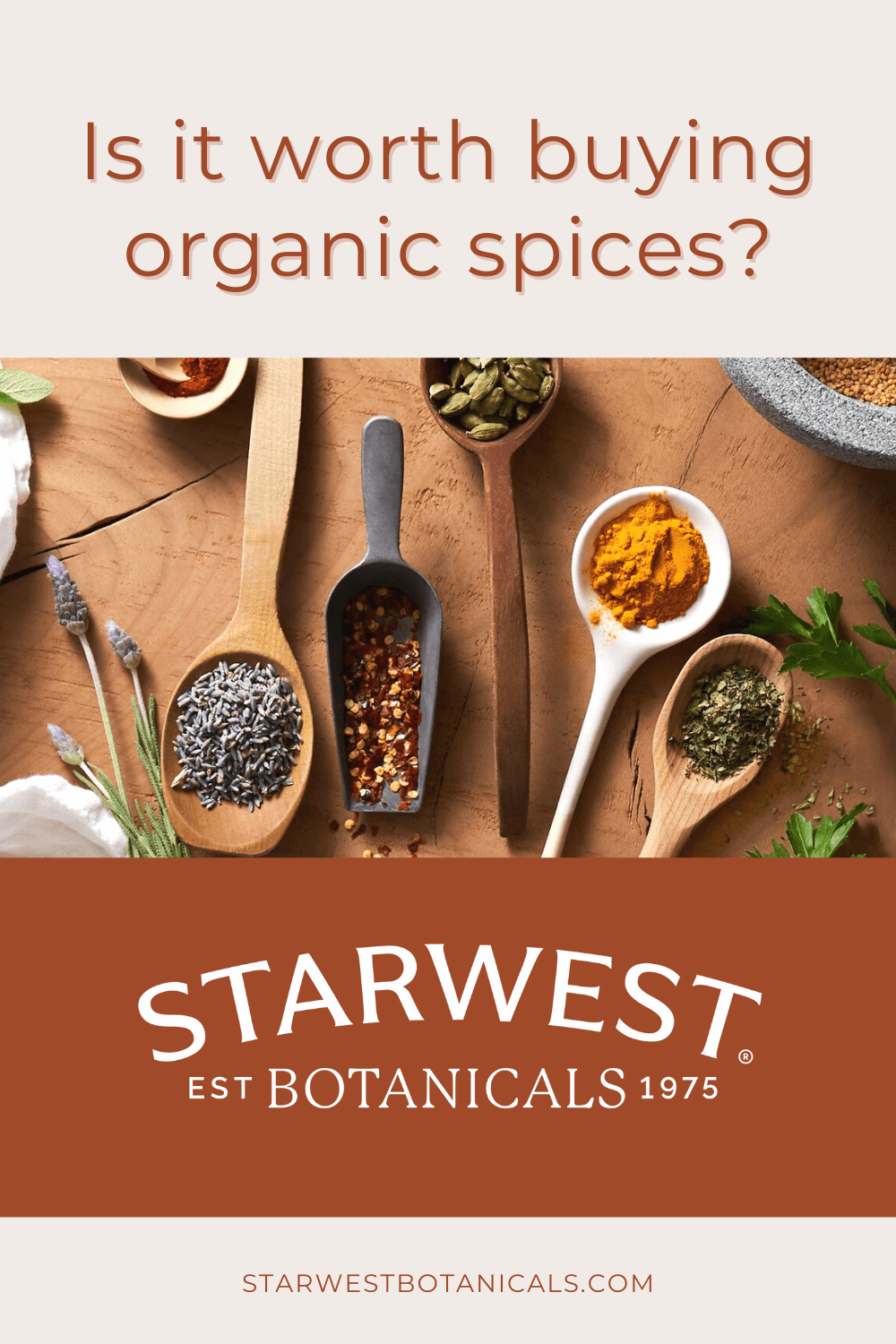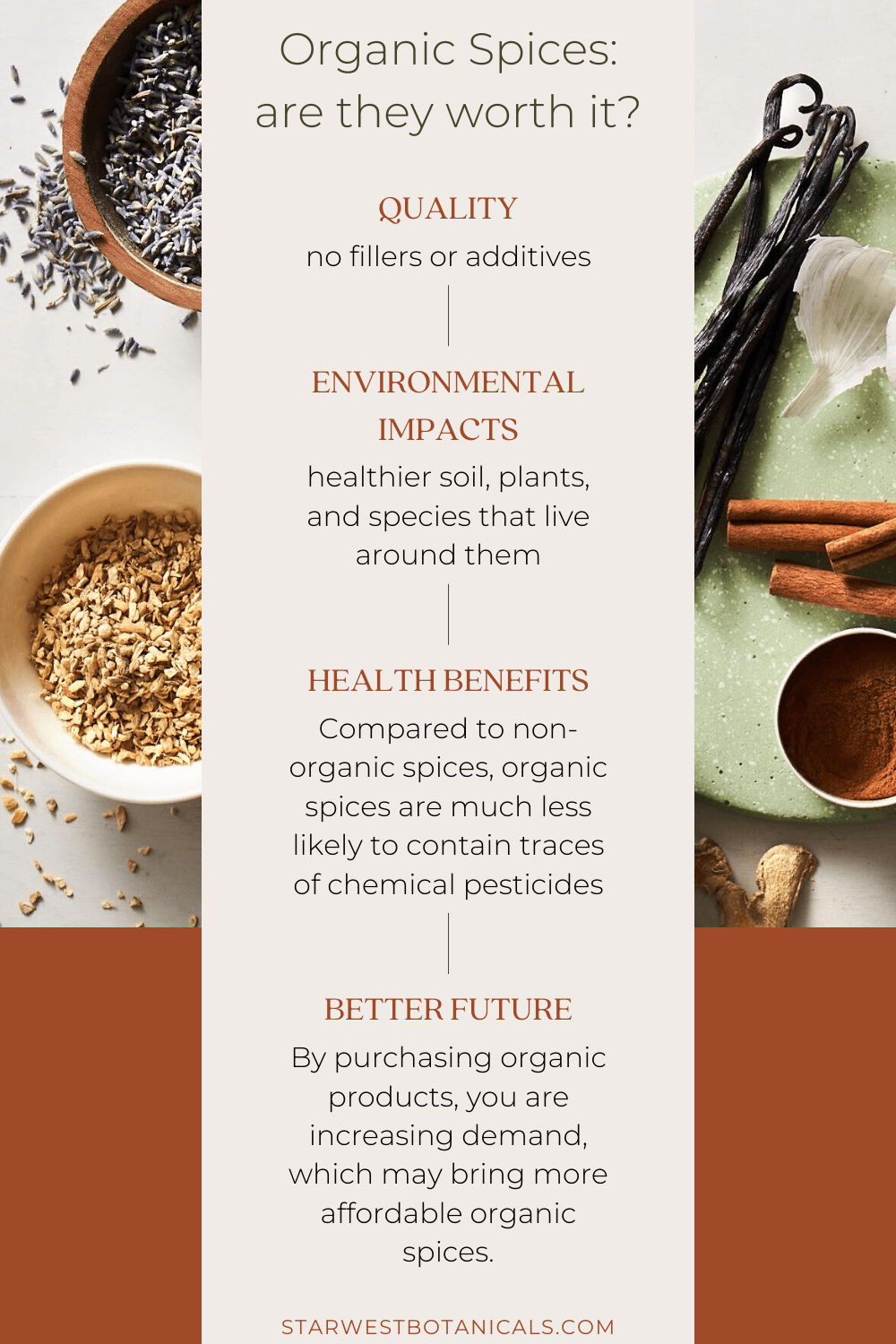Is It Worth Buying Organic Spices? | Starwest Botanicals
Posted by Starwest Botanicals Content Team | Medically Reviewed by Daniel Powers, MS on 07-12-2022

From a sprinkle of cinnamon on your morning toast to a carefully-curated blend of flavors in your next pot of stew, the right spices can take any food from bland to bursting with flavor. But with so many to choose from, it can be hard to know which seasonings to throw into your food.
These days, there’s another spice decision to make—should you buy organic or non-organic spices?
If you’re trying to avoid GMOs, pesticides, and other non-natural additives, buying organic spices could be worth your while, especially bulk spices to get the most bang for your buck. To make an informed choice, however, it helps to know what sets organic and non-organic spices apart.
How Are Organic Spices Produced?
Spices take many shapes and can come from seeds, leaves, flowers, ground dried vegetables, and more. No matter their form or flavor, they all have one thing in common: They’re naturally derived from plants. However, not all natural products are organic.
For a spice to be considered organic, it needs to be certified by the U.S. Department of Agriculture (USDA). The USDA oversees two steps in the spice-making process—cultivation and processing. Spices must meet the standards for both processes to qualify as organic.
USDA Organic Crop Standards
From seeds to stalks, most spices come from plants whether they’re organic or not. But before they make their way to your local spice shop, organic spices must meet the organic crop standards set by the USDA:
- Zero usage of genetic engineering (GMOs), sewage sludge, or ionizing radiation
- The land must be free of prohibited substances for at least three years before harvesting
- Pests and weeds must be controlled through natural means
- Pesticides and fertilizers must be naturally-derived or part of an approved list of synthetic materials
USDA Handling Standards
In their journey from the field to your food, most finished spice products undergo some combination of drying, grinding, and packaging. The USDA also regulates these processes.
For a spice to be sold as organic, the entire preparation process must be free from:
- Prohibited materials from the National List of Allowed and Prohibited Substances
- The commingling of organic and non-organic materials
- Ionizing radiation
In other words, organic spices don’t undergo any chemical treatments or radiation, and they must be 100% organic to earn the label. Don’t worry about bacteria or pests, though—organic spices are steamed to remove unwanted contaminants.
How Are Non-Organic Spices Produced?
Non-organic spices may look similar to their organic counterparts while sitting on the shelf, but their journeys there couldn’t be more different. Let’s take a tour through all the parts of the production process for non-organic spices.
Planting and Farming
Like organic spices and organic herbs, non-organic spices begin their lives as plants. But during the cultivation of those plants, they may be subject to substances or practices that are prohibited for organic spices.
Farmers start by planting the seeds for spices in the ground. If they’re not an organic producer, their seeds may be genetically modified organisms (GMOs for short). In short, GMOs are products whose genes have been altered in a lab.
During the life cycle of their crops, non-organic producers may also use chemical additives to keep their spice plants safe from pests and weeds. These could include:
- Herbicides
- Insecticides
- Fungicides
While these chemicals keep weeds and pests away from the crops, some of them can be toxic, and trace amounts of herbicide and pesticide residue can end up in our food.
Sterilization
After harvesting, non-organic, conventional spices travel to mills for cleaning, drying, grinding, and packaging. At this point, producers generally use one of two methods to sterilize the ground spices and kill off any organisms—fumigation or irradiation:
- Fumigation – By exposing spices to a potent chemical gas, producers can ensure that fungi, mold, bacteria, insects, and other undesirables are neutralized.
- Irradiation – An alternative to fumigation, irradiation involves exposing spices to radiation. Foods are irradiated using X-rays, gamma rays, and electron beams. While the term “radiation” may be alarming to some, the U.S. Food and Drug Administration (FDA) insists that irradiated food is safe.

The Verdict: Is It Worth It to Buy Organic Spices?
Because non-organic spices have been “the norm” for so long, many farming and production systems are set up to include fumigation, pesticides, and more. Organic producers look to buck these trends through innovation and natural cultivation processes.
Producing an organic product can add to the overhead cost, meaning that organic spices may be more expensive than their non-organic counterparts. However, the benefits of organic spices more than make up for the slight price increase.
The same way you consider buying organic produce, you may want to consider making the switch to organic spices. For example, the EWG’s Dirty Dozen list includes everyday produce that has the highest amount of pesticide contamination, and which they recommend buying organic.
Ranking number 7 on that list is bell & hot peppers. So when you’re at the store considering paprika vs cayenne, you may want to make sure it is certified organic.
So, is it worth buying all organic spices? In our opinion, opting for organic is worth it for four reasons:
- Quality – First and foremost, organic spices pack a flavorful punch. Because there are no fillers or additives, all you’re eating is the spice itself. It’s simple and delicious.
- Environmental Impacts – Many organic farmers use cultivation practices that are closer to how plants grow in nature. This can mean better health for the soil, the plants, and the many species that live around them. Many organic suppliers also ensure their products are ethically and sustainably sourced. When you buy organic spices, you’re usually making the greener choice.
- Health Benefits – Compared to non-organic spices, organic spices are much less likely to contain traces of chemical pesticides. Organic spices can be some of the healthiest spices you can consume. Because some preliminary research suggests that pesticides can contribute to health disorders, you can avoid potential concerns by buying organic.
- Creating a Better Future – Finally, by purchasing organic products, you’re voting with your wallet. You’re showing producers that there’s a market for organic ingredients. In time, more demand could lead to more supply, which may ultimately bring more affordable organic spices.
Make the Switch with Starwest Botanicals
Whether you decide to stick with your usual spices or make the switch to organic spices, you can find the highest quality from a source that prioritizes traceability, transparency, and trust. Ultimately, when you choose foods you can trust, you’re investing in your health and the planet—all while guaranteeing the full-bodied flavor of your favorite dishes.
At Starwest Botanicals, our quest for quality is number one. That’s why the vast majority of our bulk spices are USDA Certified Organic. No matter what you’re cooking, you’ll find organic seasonings to spice up any snack.
Sources:
U.S. Forest Service. Spices and Herbs. https://www.fs.fed.us/wildflowers/ethnobotany/food/spices.shtml
U.S. Department of Agriculture. About the Organic Standards. https://www.ams.usda.gov/grades-standards/organic-standards
U.S. Food and Drug Administration. How GMOs Are Regulated for Food and Plant Safety in the United States. https://www.fda.gov/food/agricultural-biotechnology/how-gmos-are-regulated-food-and-plant-safety-united-states
Frontiers in Public Health. Chemical Pesticides and Human Health: The Urgent Need for a New Concept in Agriculture. https://www.ncbi.nlm.nih.gov/pmc/articles/PMC4947579/
U.S. Food and Drug Administration. Food Irradiation: What You Need to Know. https://www.fda.gov/food/buy-store-serve-safe-food/food-irradiation-what-you-need-know
U.S. Food and Drug Administration. Conservation and Biological Diversity in Organic Production. https://www.usda.gov/media/blog/2016/02/29/conservation-and-biological-diversity-organic-production
Environmental toxicology and pharmacology. Hazardous effects of chemical pesticides on human health-Cancer and other associated disorders. https://pubmed.ncbi.nlm.nih.gov/30199797/


